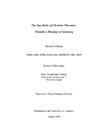The specificity of Christian theosony: towards a theology of listening
Abstract
The burden of this thesis is to show that of all the existential prevenient sites where nature prepares for the event of revelation, the human ear is the most sensitive and theologically attuned. The foundation stone of this work is that the encounter with the incarnate Word of God through the Holy Spirit takes place primarily, although not excepting other media, through the human sense of hearing, listening and its associate silence. The second hypothesis proposed here is that such acts of listening to the Spirit of God are undervalued, unexplored and unappreciated in Western Christianity. That sound preceded sight is a fact of the Christian narrative yet the Christian tradition has made little effort to develop a methodology to explore such an aural concept of God’s self-disclosure.
Without overestimating the intention of this thesis, it would be fair to say that the present writer has identified a lacuna in theology. It is her modest intention to propose and sketch one possible methodology in order to begin to address this absence. At the outset, I wish to underline three elements of our proposed methodology: Firstly, defining an aural ontology requires the coining of a new word: theosony. Secondly, four branches of learning are harnessed to sketch the groundwork towards a theory of auditory Christianity: theology, philosophy, biology and linguistics. Thirdly, a taxonomy of divine/human encounter through the medium of sound will be set out.
God provides both the faculty of hearing and the content of what is heard as prevenient grace. Such aural grace is ubiquitous and indiscriminate, it precedes all human experience in and of the world. ‘Theo’ in theosony evokes this graced Christian experience. Theosony itself is treated at three levels: Cosmic Theosony relates to all sounds which are non-human, mundane and pre-conceptual; Kerygmatic Theosony deals with sounds that communicate, carry a message or a meaning; Silent Theosony treats of the intimate salvatory presence of God that is silent, aphonic and solitary. As in human silence, the realm of God’s silence is a positive ground or horizon of sound; theosonic silence is, in this sense, the horizon of God.
Many insights from contemporary philosophy have been used to develop this aural ontology. For the most part, this work could be described as a phenomenology of hearing as the basis for human interconnectedness including our relationship with God. It describes the human ear as the heart of human being: the membrane which allows access to all that is beyond ourselves and, therefore, one of the most privileged inlets to God.
Keywords
Towards a phenomenology of silenceTheosony
Oral nature of Scripture
Aural nature of Scripture


